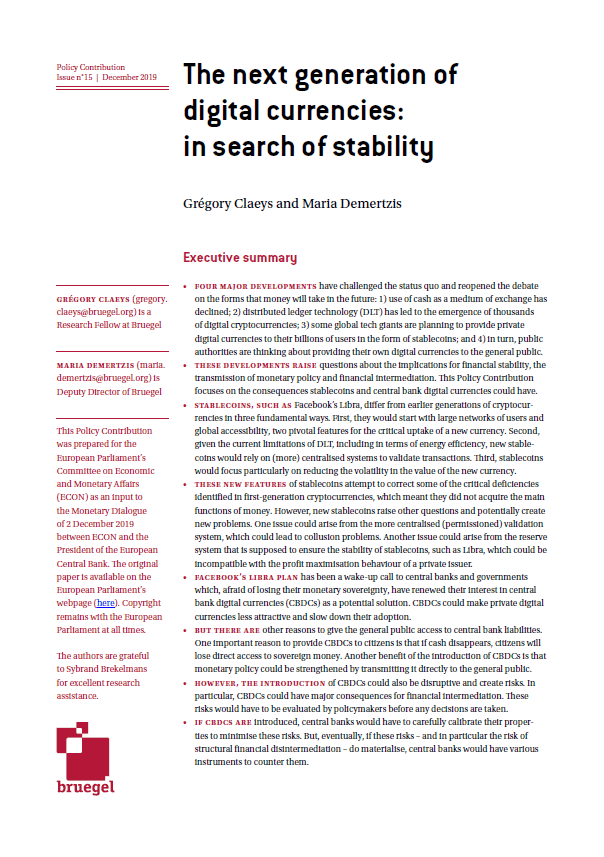Opinion

China's yuan nowhere near cracking US dollar hegemony
For all Beijing's ambitions of cracking the hegemony of the US dollar in the face of Trump administration sanctions, the yuan still has a long way to go.
Opinion

For all Beijing's ambitions of cracking the hegemony of the US dollar in the face of Trump administration sanctions, the yuan still has a long way to go.
Opinion

The U.S. and China’s negotiations on a phase-one deal seem to have stalled again. The market was already aware of the limited nature of the likely deal, but was still hoping for it. Against this backdrop, the investors have reacted negatively to the increased likelihood of not reaching a deal on December 15. If this is the case, the U.S. will apply additional tariffs on Chinese imports. The obvious question to address, thus, is, what can happen to China under such a scenario?
Policy Contribution


Recent developments have re-opened the debate on the future of money. This Policy Contribution discusses two aspects: the implications of the rise of global private stablecoins, such as Facebook's Libra, and the role that public central bank digital currencies could play.
Blog Post


Facebook’s new cryptocurrency has the potential to be both widely accessible and attractive to those countries that do not have strong sovereign currencies. So far regulators have treated such currencies as a minor risk to national economics, but the Libra could change everything.
Blog Post

The future of Sino-American relations after the incoming end of trade talks between Beijing and Washington. We review opinions in the English-speaking blogosphere on the likely content of the deal and the message this agreement sends to the world.
Blog Post

There is a strong case for an oil benchmark in euros. Trading energy markets in more than one currency is not unprecedented, and indeed used to be the norm. Europe – with its powerful currency and reliable regulatory environment – should stand a good chance of success.
Policy Contribution

Is a more important international role for the euro worth pursuing? What measures would achieve this result, if it is worth pursuing?
Opinion

Marek Dabrowski and Lukasz Janikowski analyse why private money has historically failed in competition against sovereign currencies and what it means for modern virtual currencies, such as Bitcoin.
Blog Post


The authors assess whether the euro area should pursue a greater international role for the euro, as outlined by European Commission president Jean-Claude Juncker, and how it might go about doing so.
Blog Post

The recent State of the Union speech by Jean-Claude Juncker sparked a discussion about the potential wider use of the euro on the international stage. Historically, it is not the first debate of this kind. Emmanuel Mourlon-Druol analyses four previous cases of debates on international currencies to reveal the different scenarios associated with their greater use, as well as the need to have a clear objective for a currency’s internationalisation.
Blog Post

“It is absurd that Europe pays for 80% of its energy import bill – worth €300 billion a year – in US dollars when only roughly 2% of our energy imports come from the United States,” said President Juncker in his state of the union speech.* Europe’s largest supplier of energy – Russia, who accounts for a third of that bill – couldn’t agree more. Russia’s offer to switch to euros in trade with the EU will likely be costly to implement, but the US switch towards unilateralism is forcing its long-standing partners to question the dollar’s global dominance.
Opinion

Eurozone membership (or the use of a fixed exchange rate) was not a factor determining economic success in Central Europe. There were both good and bad macroeconomic performances in both the flexible and the fixed exchange rate regimes of Central European countries. The implication is that Central European “outs” could be economically successful both with and without the euro, yet the EU is not only about economic benefits.